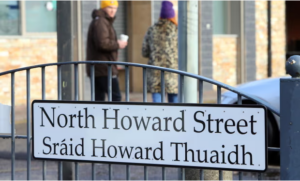Council of Europe also calls for more support for Cornish, Scots, Scottish Gaelic, Welsh and Manx Gaelic

An Irish and English street sign in west Belfast. Photograph: Paul McErlane/EPA
The UK is being urged by Europe’s leading human rights organisation to push ahead with strategies to promote the use of Irish and Ulster Scots languages in Northern Ireland despite continued tensions over the issue.
The Council of Europe experts also want to see the strengthening of teaching of all minority languages in the UK including Cornish, Scots, Scottish Gaelic, Welsh and Manx Gaelic in the Isle of Man.
They are among the main recommendations of the latest report on the UK and the Isle of Man published by the committee of experts of the European Charter for Regional or Minority Languages.
Their recommendation comes as the hit movie Kneecap, about the eponymous Belfast republican Irish language rap trio, made by the former Daily Star journalist Rich Peppiatt, continues to enthral audiences and drive home its subtext over the loss of indigenous languages.
Legislation to enhance and develop the use of both Irish and Ulster Scots in language, arts and literature was passed two years ago after a long battle resulting in the Identity and Language Act 2022.

Two years on, the Council of Europe is calling for the act to be fully implemented despite continuing political tensions. Their experts found that overall there was a “good framework for protecting regional or minority languages” in the UK but that, in the case of Cornish, Scots and Ulster Scots, there was an “over-reliance on volunteers” for its development.
It also noted that the lack of a central government strategy meant minority language education was being left up to local or regional authorities, leading to an inconsistent approach and lack of funding.
“The ability to communicate in Welsh is guaranteed in all relevant local councils, but this is not always the case concerning Scottish Gaelic, Scots, Irish, Ulster Scots or Manx Gaelic and it is not possible for Cornish,” the report said.
Ulster Scots has official minority status. It was recognised as a language in its own right as part of the 1998 peace deal and again in 2001 when the European charter for regional and minority languages came into force in the UK.
But neither it nor the Irish language are widely spoken in Ireland or Northern Ireland and are seen as under threat if neglected. According to the 2021 census, just under 30,000 people (1.14% of the population) in Northern Ireland said they could speak, read, write and understand Ulster Scots.
While some 230,000 said they had some ability in the Irish language, just 43,500 (2.43%) said they spoke Irish daily.
The Council of Europe report notes that one of the issues for minority languages in the UK is that devolution has meant regional and local authorities have a “lot of discretion”, with the teaching of history and culture related to minority languages “not guaranteed”.
It also says the government should “without delay” implement “fully” the Identity and Language Act 2022 as well as devise a plan for the recruitment of Irish language teachers, including the training of teachers for children with special needs.
It also says the government must “provide forms and means for the teaching and study” of Ulster Scots and to promote the understanding of the language.
Minority language broadcasting was one way to promote language understanding and use, as non-English-language TV stations such as S4C and BBC Alba already show.
Further recommendations including a call to ensure the translation into Irish of the most important laws in Northern Ireland and a move to remove local authority barriers to bilingual signage so that traditional Irish place names can be used in towns and roads.


